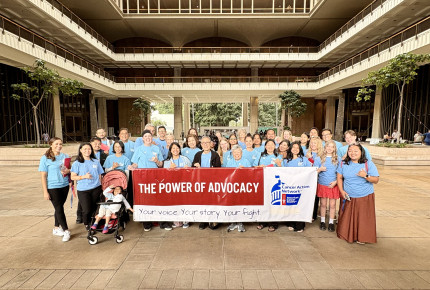Hawaii Survivors, Patients Urge Increased Access to Care During ‘Cancer Action Day’ at State Capitol
 Volunteer advocates, including cancer survivors, patients,
Volunteer advocates, including cancer survivors, patients,
MONTPELIER —February 28, 2017— Tomorrow, Governor Phil Scott will proclaim March 2017 as Colorectal Cancer Awareness Month by issuing a statewide proclamation. Gov. Scott’s support is part of a nationwide movement led by the patient advocacy organizations working towards the goal of all 50 states acknowledging March as Colorectal Cancer Awareness Month. This state based initiative complements colon cancer fighting work currently being done in Congress to pass the Removing Barriers to Colorectal Cancer Screening Act.
Every three minutes in America someone is diagnosed with colorectal cancer and every 10 minutes someone dies from the disease. Adequate screening could prevent the majority of deaths from colon cancer, yet more than one in three Americans is not getting screened as recommended
The American Cancer Society Cancer Action Network (ACS CAN) applauds Gov. Scott for bringing attention to a disease expected to kill approximately 50,000 people in the United States this year.
“There are several screening options available including a simple take home option,” said Jill Sudhoff-Guerin, director of government relations for ACS CAN in Vermont. “As part of a movement to get 80 percent of the population screened for colon cancer by 2018, we join the American Cancer Society in asking everyone to talk to their doctor about getting screened because the best test is the test that gets done.”
Colorectal cancer is the third most commonly diagnosed cancer and the second most common cause of cancer deaths in the country. This year alone, an estimated 136,000 people in the U.S. will be diagnosed with colorectal cancer, and more than 50,000 will die from the disease. Compounding the tragedy is the fact that colorectal cancer is one of the most preventable forms of cancer.
In Congress, legislation has been filed to ensure those at risk of colon cancer are not avoiding potentially lifesaving screenings due to cost. The Removing Barriers to Colorectal Cancer Screening Act (H.R. 1017) aims to close a loophole in Medicare that allows seniors to be charged for a colonoscopy if a polyp is found and removed during a screening colonoscopy.
“Half of colorectal cancer deaths could be prevented each year if every individual age 50 and older received recommended colorectal cancer screenings,” said Sudhoff-Guerin. “Unfortunately, many people are deterred from getting screened by cost-sharing. This bill will make colorectal cancer screenings more accessible to more people, regardless of their ability to pay. More seniors getting screened will result in fewer cases of cancer, reduced costs of treating the disease, and most importantly, fewer needless deaths from a disease that is easily detected and prevented.”
“By combining efforts at the state and federal level, we can achieve the goal of having 80 percent of the population screened for colon cancer by 2018, which would will result in countless lives saved,” said Sudhoff-Guerin.
ACS CAN is the nonprofit, nonpartisan advocacy affiliate organization of the American Cancer Society, dedicated to eliminating cancer as a major health problem. ACS CAN works to encourage lawmakers, candidates and government officials to support laws and policies that will make cancer a top national priority. ACS CAN gives ordinary people extraordinary power to fight cancer. For more information, visit www.fightcancer.org.